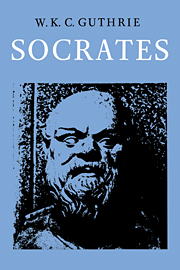I - PROBLEM AND SOURCES
Published online by Cambridge University Press: 05 August 2012
Summary
GENERAL
It is a bold—some will say over-bold—procedure to try to separate Socrates from plato. In the dialogues of plato it would seem that he has so blended his own spirit with that of Socrates that they can never again be separated. I thought so myself until I came to write an account of the Sophistic movement; but the study which this necessitated has made me see Socrates as squarely set in his contemporary world of the Sophists, Thucydides and Euripides and an eager participant in their arguments. Certainly it has been impossible to leave him out of the previous sections describing fifth-century controversies. Plato, for all his reverence for Socrates as the inspiration and starting point of his own reflections, is a more sophisticated philosopher and marks a new and fateful development in the history of thought. I would even claim that in reading plato himself, without any checking or supplementation from other sources, one gets a strong impression that he was an essentially different philosophical character from the master through whose mouth he so often expresses the results of his own maturer and more widely ranging mind. He was still passionately concerned with the questions which excited the previous two generations—whether law and morals were natural or conventional in origin, whether ‘virtue’ could be taught, whether intelligence or inanimate nature was prior, whether all values were relative, the nature and standing of rhetoric, the relation between being and seeming, knowledge and opinion, language and its objects—and to him Protagoras and Gorgias, Prodicus and Hippias were still opponents whose challenge had not been adequately met; but to meet it called for something far more radical and comprehensive than the simple ethical intellectualism of Socrates.
- Type
- Chapter
- Information
- A History of Greek Philosophy , pp. 5 - 57Publisher: Cambridge University PressPrint publication year: 1971

